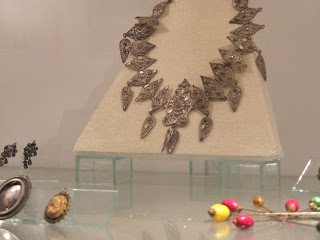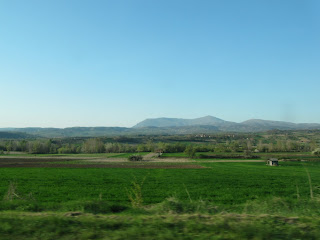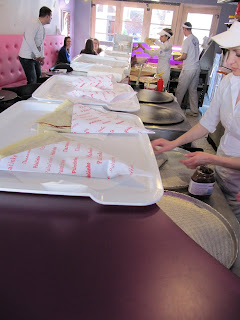Maybe they're not as entertaining as
idioms, but they are more frequent and useful in everyday speech.
Nema problema = no problem, the assonance of this phrase makes it one of my favorites
Nemam pojma = I have no idea
Side: perhaps you noticed that neither of these has a subject, in fact unless used for emphasis pronouns aren't included so you must listen to the verb ending to know who the speaker is referring to. Another Serbian-English difference shown in the first example is that there are no articles in Serbian. Hasn't problem would be the direct translation of this one. This is the most common mistake of Serbians who speak English because they leave out "a" or "the."
Izvoli/Izvolite = literally: here you are, but it's also what vendors say when you approach any shop or food stand, what a host says as they welcome you into their home, what people say to formally answer the phone, and what waiters say as they begin to take your order. The first is informal and the
te is formal and plural.
Prijatno = enjoy. This is always said before a meal and whenever you see someone else eating, whether you know the person or not. The first thing our group thought of as a translation was
bon appetit, hardly English. It's a pity we don't have a natural, exercised expression for "enjoy your meal." The meal is more enjoyable when a stranger casually blesses it for you. Prijatno is also use when you leave a shop, stand or restaurant, when guests leave your house, and when you leave to go out.
Sve najbolje = all the best, this is said all year but especially on New Years
Kako/što da ne = literal: how/why yes no. Basically it's used as a sarcastic, "duh" sort of remark. Apparently "how yes no" is a Spanish expression as well. The two languages are vastly different so it's interesting that identical expressions have emerged through time. The usage of
kako (how) is also interesting. When we would normally use "what" in English, Serbian uses
kako. If you don't hear something properly:
kako?. If you don't agree with what you hear:
kako?!. This is true for French as well (
comment) so I have a feeling English is the oddity.
Bre = *exaggeration,* used only in Southern Serbia but used a lot a lot. People will just throw it into sentences to stress their point. It's basically hyperbole in a word.
Lele = *gasp* or "oh dear", another only Southern expression. If you drop something:
lele. If you're late:
lele. My favorite part about this expression is the variation in how it's said. Some will draw out each syllable (le pronounced lay), others will make it short and quick. Timbre varies as well.
Overi ga tebra = stamp it, brother. Another colloquial phrase that's used more in the south than north. It's accompanied with a fist pound so it's the equivalent to the English slang "pound it." The second part of this phrase is equally interesting.
Tebra is the inverse
brate which means brother, but in slang people use the former more than the latter and brother isn't literal, it just refers to a pal.
Gde si? = literally: where are you, in our vernacular it would be "what's up"
Merak nema cenu = merak is the ultimate, irrepressible, bona fide, undisputed desire of an individual. It can be a material item that you must possess, a person that you must have, or an activity that you must do no matter the cost, which is the rest of the phrase. Merak has no price. All Serbs know and live by this concept of merak and if you introduce something as your merak it remains unquestioned because it's a desire that you know when you have it and it needs no explanation. Even if it sounds completely insane as long as you mention
merak it's clear to all. My host sister, Milena, explained this concept and she said that her merak happened (that's what she said: happened, like it's takes place as you grow up) when she was 17. She and her father were walking along a boardwalk in Macedonia and she saw people bungee jumping for the first time and told her father she had to do it. When she found out how expensive it was she started to doubt whether her dad would pay for it but he told her, "
Merak nema cenu" and she merrily jumped away. She tried to connect my first time skiing with merak because I have wanted to ski since I was nine but never had the chance. Though I truly did want to ski I'm not sure if I can relate to the almost compulsive nature of merak. Still it's a fascinating concept and I've heard people bring it up in conversation after which any doubts seemingly fade from the minds of those not experiencing the merak because they know and maybe have experienced the power behind it.
Verovatno = probably
Neverovatno = incredible
The reason for including these two is that just earlier this month I found out that I had been using
neverovatno wrong for months as I thought it meant probably not, which is actually
verovatno ne. Since the people know that I'm a foreigner I hope they understood my mix up and didn't actually think I was dubiously uttering "incredible."
Another peculiarity is that there are different words for Aunt and Uncle depending on your relation to them:
Father's brother and his wife --
stric &
strinaMother's brother and his wife --
ujak &
ujnaMother/father's sister and her husband --
tetka &
tečaIronically, even with all these distinctions there is no word for cousin, they are simply referred to as siblings:
sestra i brat (sister and brother). This caused confusion in Novi Sad when my little host sister told me all about her three sisters and two brothers. I thought she was going through an imaginary friend stage.
Hopefully this look into Serbian language is interesting.
Sve najbolje!
























































